Advances in anti-ageing treatments could soon help human beings regenerate their bodies
AUSTRALIAN scientists have created an anti-ageing pill that is turning back the clock for those trialing it, which could cost as much as a coffee a day.
National
Don't miss out on the headlines from National. Followed categories will be added to My News.
EXCLUSIVE: Infertility could be reversed, paralysed people could walk again and a 70 year-old-body could be reprogrammed to be just 20 years old thanks to a remarkable anti-ageing breakthrough by Australian scientists.
In a world first, a team of researchers led by University of NSW and Harvard Professor David Sinclair has developed a cell reprogramming process that could regenerate the human body.
He predicts the development could eventually cure paralysis and allow people to regrow damaged kidneys, livers and other organs and it will be trialed in humans in 2020.
In a separate development, the same team has also developed a vitamin B derivative tablet that appears to reduce baldness and reverse infertility.
It could allow 60-year-old women or those made infertile by chemotherapy to have children, Professor Sinclair says.
MORE: How to make the ‘anti ageing’ smoothie
OBESITY: Is your community making you fat?
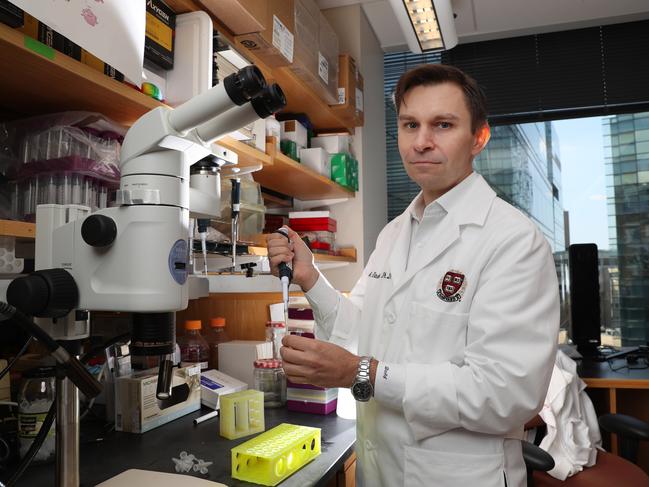
The pill increased the lifespan of mice by ten per cent and also appears to reduce hair loss associated with age.
Professor Sinclair’s sister-in-law was in perimenopause in her late 40s but after starting the tablet she became fertile again.
The finding by the team’s University of NSW researcher Dr Lindsay Wu is yet to be published or peer reviewed and he says “We do not recommend that people go out and take NAD precursors as they have not yet formally been tested for safety”.
Human trials are due to begin next year.
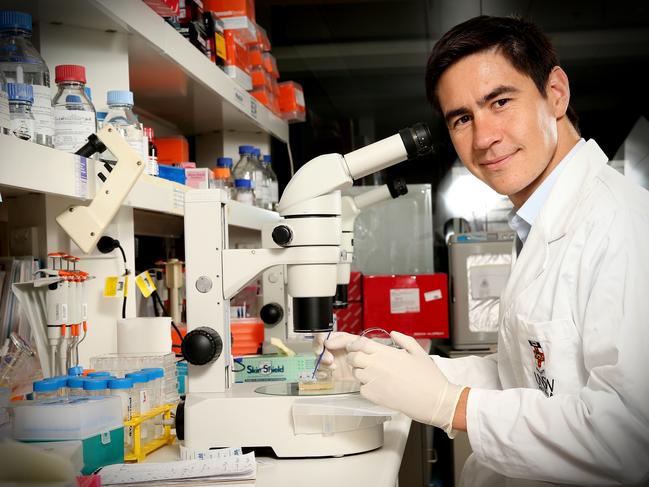
Sinclair, who is taking his own age boosting molecule, says his biological age went from 57 (he’s 49) to 33 years as a result of the pill he hopes will be on the market within five years and cost as much as a coffee a day.
Professor Sinclair’s 79-year-old father, who began the treatment 18 months ago, is white water rafting, caving, recently spent six days carrying a backpack up Cradle Mountain in Tasmania and “has the fitness of a 20 year old.”
News Corp uncovered the breakthroughs as part of a wider investigation into the extraordinary measures Australians are taking to prolong their lives.
A leading Australian businessman has told News Corp he spent $8000 last year to have the blood of 18 year olds injected into his body to prolong his life after research showed it reversed the ageing process in mice.
Tech millionaires like Google’s Ray Kurzweil are consuming around 100 pills a day in a bid to live as long as possible while others are using machines that transmit electromagnetic waves and powerful medications meant for organ transplants patients.
Professor Sinclair says his discoveries are “world changing”.
“We have discovered genes that reprogram cells to be young again and that is really on the cutting edge and would be not just feeling young but actually being young again,” says Professor Sinclair.
“If you lose a piece of your body or need an organ transplant we could rejuvenate old tissue,” he said.
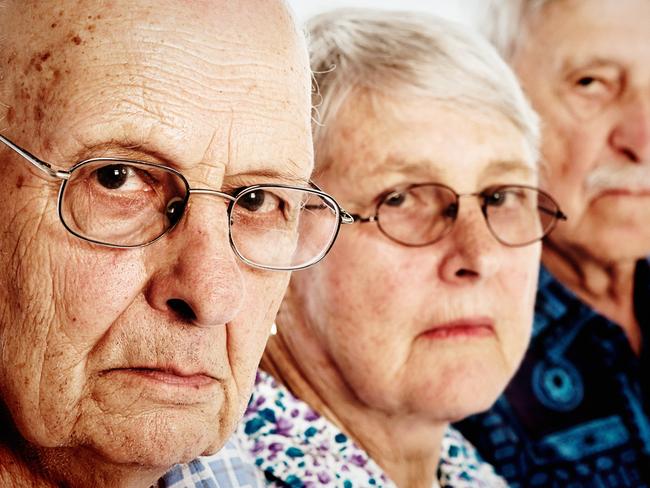
As part of their research the team has regenerated nerve tissue in mice with damaged spinal cords and the hope is it could allow paralysed people to walk again.
“People think we are exaggerating but that is the direction we are heading,” says Sinclair.
The risk is that reprogrammed cells could become too young and revert to stem cells or cause cancer but Sinclair says his team has found a way to switch the process on and off.
In 2017 the team published research in the journal Science showing how a vitamin B derivative Nicotinamide Mononucleotide (NMN) reversed the decline in blood flow to tissues and organs associated with age and improved the exercise endurance of old mice by 60 per cent.
If it works in humans it would be the equivalent of giving a 70-year-old human the traits of a 20 year old.
The team have now developed an improved version of the NMN treatment which Sinclair calls “super NMN” that could be on the market in five years.
Mice given this new molecule — Mib 626 — ran on average twice as long as the control mice (those on NMN ran only 1.5 times as long)
Some mice on Mib 626 ran three times as far as the control mice and one broke the treadmill because he kept running for 3.5 kilometres in an incident known as “the great treadmill incident”.

The most spectacular new finding comes from work by Sinclair’s PHD student Yuancheng Lu at Harvard University, who used a virus and genes to rejuvenate damaged nerve tissue in living mice.
Sinclair, who has spent 15 years researching ways to improve longevity, says more than one treatment will be needed to combat the ageing process.
Once people reach their 40s they would start taking a pill like NMN to boost their body’s level of a key molecule NAD that combats ageing.
Then, when they turned 70, they would have an injection of the recently discovered rejuvenation gene which would take the body back to a condition that was 30-40 years younger, he said.
They would then keep taking NMN pills to combat future ageing.
“I’m already on the record as saying the first person to live to 150 has already been born,” he said.
A HEAD START ON PREVENTING AGEING
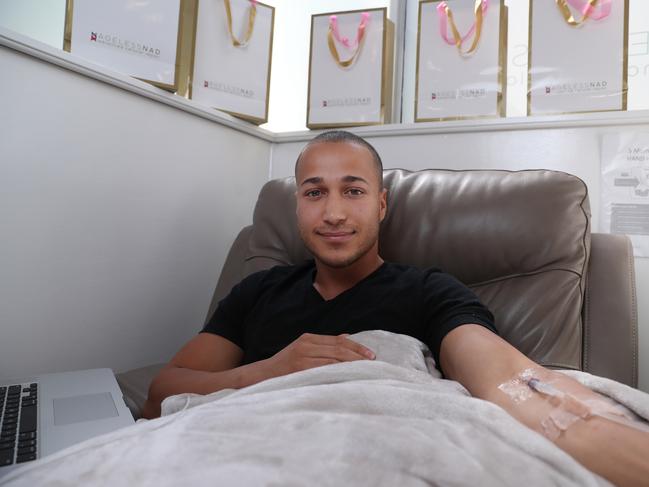
Keegan Grantham, aged just 25, seems too young to turn back the clock but he had his first infusion of the anti-ageing treatment NAD two weeks ago and plans to have at least two a year.
The peak performance and wellness coach from the Gold Coast who runs the business Evolve U says he wants to get a head start on preventing ageing.
“A lot of the clients I’m going to be helping are entrepreneurs who maybe don’t have enough time to look after their health but they have got the resources so getting me to show them the way to do it can be quite powerful,” he says.
The Ageless NAD clinic in Sydney’s Bondi Junction, where he received the infusion, is run by integrative medicine GP Dr Jeremy Cumpston, who spent two years studying the use of NAD in the US where they are used to treat alcohol and drug addiction.
His clinic provides infusions of NAD which is put into the body via a drip straight into a patient’s arm.
The process takes up to eight hours and costs between $800 and $1400.

“In Australia you have to get a prescription under a special access scheme for NAD and it has to be ordered from a compounding pharmacist,” he says.
Dr Cumpston says he is mainly using the treatment to beat drug and alcohol addiction and testing on his patients showed a special double encapsulated tablet form of the treatment raised NAD levels by 20 per cent.
“People are using it as a brain boost; we’re getting significant improvements in productivity and a feeling of mental wellbeing and calmness in our patients,” he said.
Kate Lynch and Susan Hansen, also patients of the Bondi Junction clinic, say the treatment made their brain sharper.
Ms Lynch, 42, says she had never been able to bench press more than 20 kilograms before the treatment but for the first time ever was lifting 25 kilograms after regular infusions.
The molecule nicotinamide adenine dinucleotide (NAD) helps the body repair damaged DNA and it provides vital energy cells need to stay healthy.
NAD has been shown to work as a neurotransmitter in the brain improving learning and memory after traumatic injury. It also helps improve sleep.
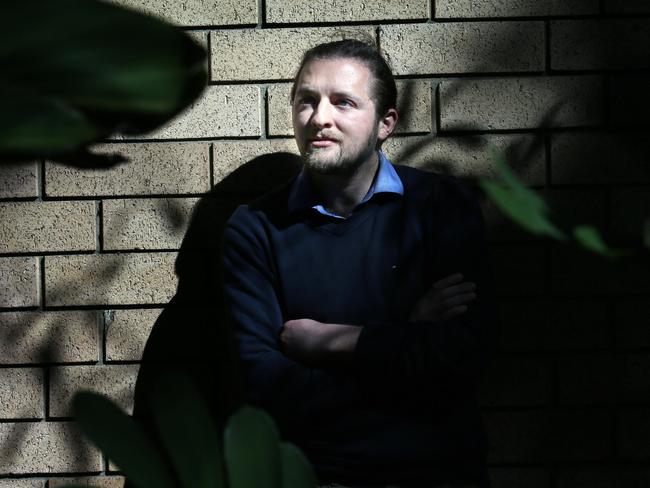
University of NSW researchers Dr Nady Braidy and Dr Ross Grant discovered that as humans reach middle age their NAD levels declines and that maintaining adequate amounts of the molecule could help fight the ageing process.
Dr Braidy developed a test that measures NAD levels in the blood and it can show whether anti-ageing treatments actually work to increase NAD levels.
The longevity treatment NMN and Mib 626 being developed by David Sinclair works to stimulate the production of NAD.
Dr Cumpston says he prefers to deliver NAD direct to the body rather than use a treatment that is a precursor to the molecule.
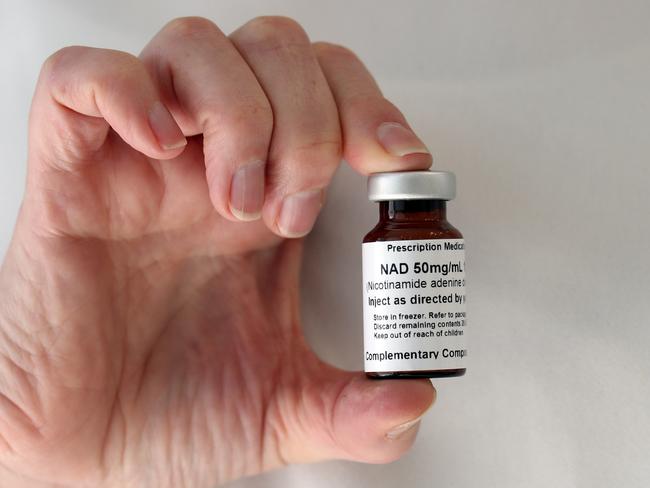
FAMOUS PEOPLE WHO ARE TRYING TO LIVE LONGER
* Peter Thiel, 47, PayPal co-founder and Facebook’s first investor, is taking human growth hormone as part of his regime to reach 120.
* Dmitry Itskov, a Russian multi-millionaire is funding a 2045 Initiative, to create technologies that would see an individual’s personality transplanted into a robot or other non-biological carrier to achieve immortality.
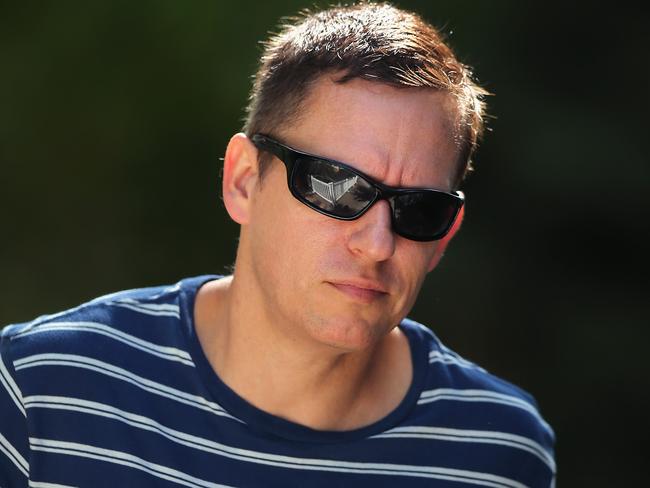
* Google’s Ray Kurzweil, who believes in the Singularity — the idea that humans will merge with A.I. — swallows 90 pills a day, including metformin, basis; coenzyme Q10 for muscle strength; and phosphatidylcholine, to keep his skin supple. He eats berries, smoked salmon and mackerel, dark chocolate, soy milk and porridge for breakfast.
* Google co-founder Sergey Brin wants to be immortal, telling The New Yorker in 2017: “Yes, I was singled out for death; no, I’m not actually planning to die.” His company has invested over $1 billion in a “longevity lab” called Calico (short for the California Life Company) that aims to discover new drugs to combat ageing.

PROVEN MAINSTREAM WAYS OF LIVING LONGER
* People who consume 25-30 per cent fewer calories than they need tend to live longer, studies have shown
* Eat the Mediterranean or Okinawan diet which is plant based and includes whole foods.
* Exercise helps reduce cell ageing.
* Social interaction has been found to help prevent dementia.
* Sleep. Poor sleep impacts on memory and cognitive ability and also ages the skin faster.
* Gut bacteria helps. German researchers have shown older fish live longer if they consume microbes from the faecal matter of younger fish.
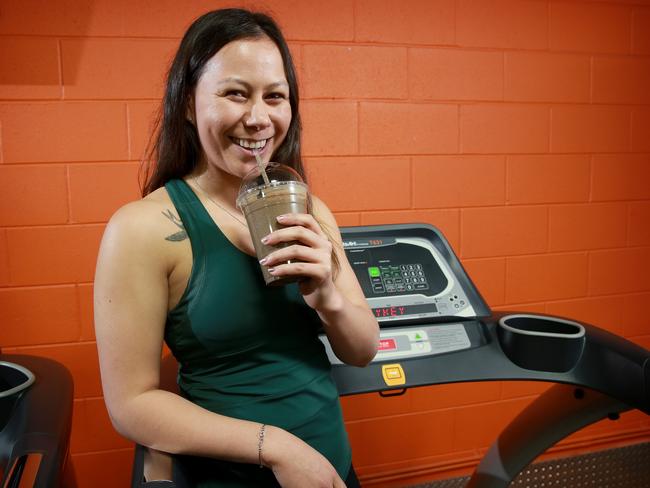
* Eat a diet high in complex carbohydrates. University NSW research shows mice on this diet lived the longest.
* Avoid a high protein diet. University NSW research showed mice on these diets had shorter lifespans. Your should consume no more than 0.88g of protein per kilogram of the healthy bodyweght for your age.
* The diabetes medication metformin has been shown to extend life by on average 15 per cent. But it can affect your kidneys.
* Rapamycin, which is normally used to aid organ transplants and treat rare cancers, has been shown to extend the life of mice by 25 per cent.
* Male eunuchs live 14-19 years longer than average according to research on Korean eunuchs.
EXTREME ANTI-AGEING TREATMENTS
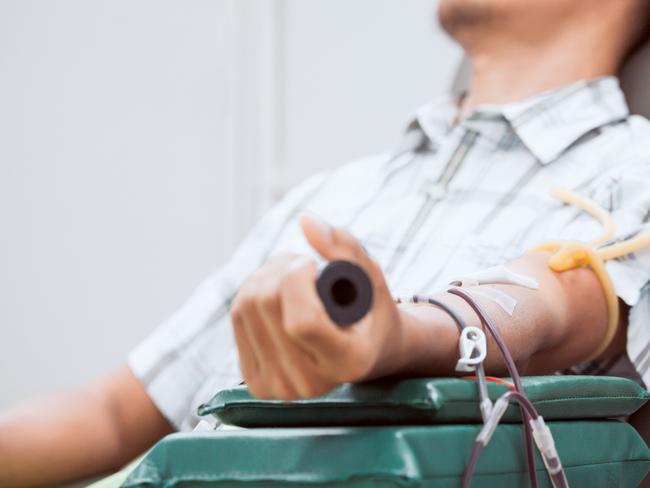
* Vampire treatments using infusions of young blood are being trialled to see if they can reverse ageing after researchers at Stanford University showed infusions of blood from young mice reversed cognitive and neurological impairments seen in old ones.
* Transplanting human minds into robots is a project being pursued by Russian billionaire Dmitry Itskov, who runs a research project called Avatar. He says he wants human beings to ‘live forever’.
* Electromagnetic wave therapy hooks people up to a machine emitting electromagnetic waves claimed to repolarise cells, restoring their sodium and potassium balance improving the immune system, blood circulation and providing pain reduction.
* Cryogenics. A Timeship is under construction in San Antonio in the United States that will house 10,000 cryonically preserved bodies awaiting reanimation, research laboratories, animal and plant DNA. These will be stored until somebody works out a way to revive them.
* Glutathione powerful antioxidant known as the “God Molecule” has been found to reduce wrinkles, age spots and improve skin elasticity but in high doses it can cause liver and kidney problems or even the rapid and potentially fatal sloughing of skin.
* Umbilical cord blood injected into mice increased the activity of several genes linked to neural plasticity and memory in one study. A company called Celularity last month raised money to research using postpartum placentas to delay the ageing process.
* Rapamycin, which is normally used to aid organ transplants and treat rare cancers has been shown to extend the life of mice by 25 per cent but it is dangerous because it suppresses the immune system.
* Human growth hormone can increase muscle mass and reduce body fat in healthy older adults but a recent study showed people in their 90s with naturally low levels of human growth hormone had a better chance of living to be over 100.
